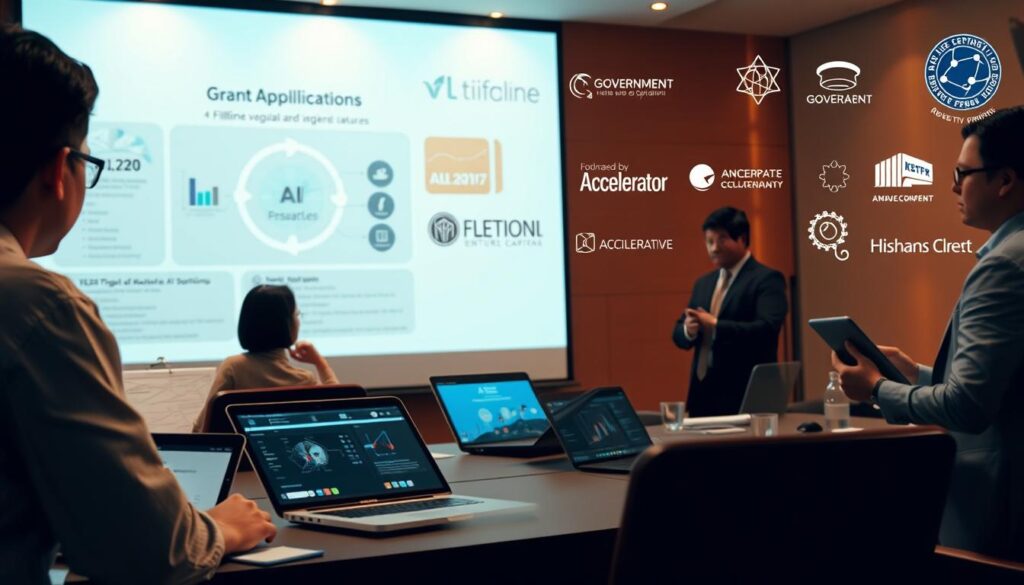Ever wondered how top AI projects get the funds they need? In the fast-changing world of AI, knowing about grants, investments, and partnerships is key. These options help organizations in Southeast Asia use AI to solve big problems in healthcare, education, and more.
Key Takeaways
- Grants, investments, and partnerships are crucial funding options for AI projects.
- Organizations in Southeast Asia can significantly benefit from targeted financial resources.
- Understanding your project funding needs is vital to securing the right support.
- AI has the potential to revolutionize various sectors, enhancing efficiency and innovation.
- Building strategic partnerships can pave the way for successful funding opportunities.
Understanding AI Funding Needs
Getting the right money for AI projects is key for companies wanting to grow and improve. This money helps them do research and create useful AI solutions. Without enough funds, many good projects might not move forward, holding back AI progress.
Importance of Financial Resources for AI Projects
Having enough money is very important. Companies need it for many things like developing AI, doing research, and running operations. In the Philippines, companies are learning that using money wisely can lead to big changes. It also lets them try new tech and keep up with market trends.
Common Challenges in Securing Funding
But, getting money for AI is hard. Companies face tough competition for grants. They also need to show they’re innovative and can keep going long-term. Plus, NGOs have their own problems like not having the right tech skills and not knowing about AI funding.
| Funding Challenge | Description |
|---|---|
| Stiff Competition | Numerous organizations compete for limited grants and resources. |
| Proven Innovation | Many funding sources require a clear demonstration of innovative capabilities. |
| Sustainability Evidence | Funding bodies often seek evidence of long-term impact and sustainability. |
| Technical Expertise | Limited in-house technical skills can hinder proposal development. |
| Awareness of Funding Sources | Organizations often lack information on AI-specific funding opportunities. |
Types of Funding Options for AI Projects
Getting the right money is key for AI projects to succeed. Knowing the different ways to fund AI can help organizations make smart choices. There are mainly three types: grants, investments, and partnerships. Each has its own features and needs.
Overview of Different Funding Sources
Grants are free money from governments or charities. They help fund specific AI projects. Investments, on the other hand, are money from investors or venture capital firms who want to make money back. Partnerships let organizations work together with tech companies or schools, sharing resources and goals.
Key Differences Between Grants, Investments, and Partnerships
Each funding option has its own good and bad points.
| Funding Type | Source | Repayment | Control | Risk |
|---|---|---|---|---|
| Grants | Government, Philanthropies | No | Minimal | Low |
| Investments | Venture Capitalists, Angel Investors | Yes | High | High |
| Partnerships | Tech Firms, Academia | No | Shared | Moderate |
Knowing these differences helps organizations choose the best funding path. By using a mix of grants, investments, and partnerships, they can increase their chances of getting funded for AI projects.

Grants: A Key Financial Support for AI Innovations
Grants are a vital source of funding for AI projects. They help validate projects and support goals that benefit society. This support makes it easier for organizations to take on big AI projects without worrying about money.
How Grants Enhance Project Viability
Grants let organizations focus on creating new AI solutions without worrying about money. This support can attract more investors, leading to even more funding. It helps organizations save money, which they can use for more development and innovation.
Notable Grants Available for AI Initiatives
There are many grants for AI projects out there. For example, Google.org’s AI for Social Good Program funds projects that use AI for good. Microsoft AI for Earth Program also offers funding for projects that help the environment. Knowing how to apply for these grants is important for getting financial support for innovations. With more AI funding available, these grants can lead to major breakthroughs.
Investment Opportunities for AI Startups
AI startups need the right funding to grow. There are many investors out there, each with their own benefits. Knowing who they are can help startups find the right money.
Types of Investors in the AI Space
In the AI world, you’ll find different types of investors:
- Venture Capitalists: They look for big returns and invest in startups with growth potential.
- Angel Investors: These are tech lovers who use their own money to support projects. They also offer advice.
- Corporate Investors: Big companies invest in AI startups to use new tech or grow their market.
- Crowdfunding Platforms: Startups can get money from many small investors. It’s a way to get community support.
How to Attract Investors for Your AI Project
To draw in investors, AI startups need a solid plan. Here are some tips:
- Write a clear business plan that shows your vision and goals.
- Highlight what makes your tech special and valuable.
- Show you have a skilled team with AI experience.
- Share your successes and any results that show you can make money.
- Talk to investors to see what they want. This can help you get their support.

Strategic Partnerships for AI Success
Working together with other groups can really boost AI projects. By teaming up, everyone can share knowledge and resources. This way, they can come up with new and better solutions together.
Benefits of Collaborating with Other Organizations
There are many good things about working together. You get to use different skills and grow your project. This also helps you move forward faster with new tech.
In Asia, AI partnerships have made a big difference. They’ve helped in areas like farming and health care. These partnerships help make things better for everyone involved.
Examples of Successful AI Partnerships in Asia
In Asia, some AI partnerships have really worked well. Tech companies and NGOs have teamed up to help farmers. They use AI to give farmers better data to improve their work.
In health care, partnerships have led to big improvements. They’ve helped make predictions and care better for patients. These examples show how AI partnerships can make a big difference in people’s lives.
Budgeting & Resource Allocation Strategies for AI Projects
Effective budgeting for AI projects is key to using financial resources wisely. Clear strategies for allocating resources help organizations work better and succeed in their projects. Good financial management is essential, even more so for new AI projects.
Effective Budgeting Techniques for Optimal Resource Use
Using techniques like zero-based budgeting and activity-based costing can greatly improve resource use. These methods make sure expenses are matched to project needs, promoting financial responsibility. By focusing on projects that offer the best value, teams can make better choices and meet their financial goals.
Tools and Resources for Monitoring Budget and Expenses
Many tools help track spending and keep an eye on financial health. Tools like Microsoft Project and Trello are great for managing budgets and keeping resources aligned with goals. Strong financial planning models give a clear view of spending, allowing for quick adjustments. Using these tools helps organizations stay flexible and adapt to changing project needs.

The Role of Research and Development in Securing Funding
Research and development for AI is key to getting funding for new projects. It shows a concept’s worth and the tech’s potential for growth. By sharing solid research, groups can make their proposals stand out, attracting more investors.
Why R&D is Critical for AI Project Funding
Investors want to see innovation to back their money. Good R&D builds trust and shows a group is a leader. A project that clearly shows its research wins more funding. It also fits with what investors want, making it more likely to get approved.
Aligning R&D Efforts with Funding Opportunities
Finding the right R&D and funding match is easier when you know where to look. Groups should watch for funding that focuses on AI advancements. By matching their R&D to these goals, they boost their funding chances. This approach also makes sure projects fit today’s trends. For more on this, see how to identify AI opportunities.
| R&D Focus Area | Funding Source | Alignment Benefits |
|---|---|---|
| Machine Learning Algorithms | Government Grants | Supports public sector innovations |
| Natural Language Processing | Venture Capitalists | Attracts tech-forward investments |
| AI Ethics | Nonprofit Organizations | Enhances social responsibility projects |
| Robotics | Private Sector Partnerships | Enables industrial advancements |
Challenges NGOs Face in Securing AI Funding
Non-governmental organizations (NGOs) often find it hard to get AI funding. Many AI funding challenges for NGOs come from their special needs and status. Knowing these obstacles helps NGOs plan better to get the money they need.
Barriers to Accessible AI Funding for NGOs
Getting AI funding is tough for many reasons:
- Many NGOs lack the tech skills needed for AI projects.
- They often can’t get into the big funding networks that help get projects noticed.
- There’s a lot of competition for grants, making it hard to get noticed.
- Funders have strict rules that can keep out smaller or newer NGOs.
- The application process can be slow and take up a lot of time and resources.
- Many NGOs don’t know about the funding options available to them.
Overcoming Key Obstacles in the Funding Process
NGOs can use different strategies to overcome these challenges:
- Working with tech companies can bring in new ideas and resources.
- Training and building skills can make NGOs more confident in handling AI projects.
- Making the application process simpler can help NGOs get funding more easily.
- Looking for funding from different places can help NGOs find more opportunities.
- Collaborating with other groups can make NGOs look more credible and competitive.

By using these strategies, NGOs can improve their chances of getting AI funding. This leads to successful projects that make a real difference in society.
Future Trends in AI Funding
The world of AI funding is changing fast. People see AI as a way to solve big global problems. New tech and creative uses of AI are leading to a shift in how money is raised for projects.
Anticipated Changes in the Funding Landscape
Looking ahead, we’ll see more partnerships between the public and private sectors. These teams will work together on big projects that can really make a difference. Investors want projects that are not just new but also help society and the planet.
Emerging Innovations That May Attract Funding
AI in healthcare, like better diagnosis and predicting health issues, will get a lot of attention. These advancements can handle big data and help many people. Projects that tackle big social issues with tech are likely to get funding, showing a new direction in AI funding.
Conclusion
The world of AI funding is full of chances for companies to fund their projects. There are grants for support and investments for growth. This variety lets companies find the right fit for their needs.
Partnerships can also help, adding value through teamwork. This is great for those wanting to make a bigger difference.
When it comes to funding, having a solid plan is key. It should include all funding options and match with research goals. In places like the Philippines, knowing each funding type well is crucial. Working together can also boost your chances of getting the funds you need.
This approach can lead to tech advancements and help solve big problems. It’s a win-win for everyone.
As we move forward, staying up-to-date with funding trends is important. Tailor your proposals to show how your work will last and make a difference. This way, you can use all the resources available to you.
By doing this, you can bring about AI innovations that help many people. It’s a step towards a better future for all.

